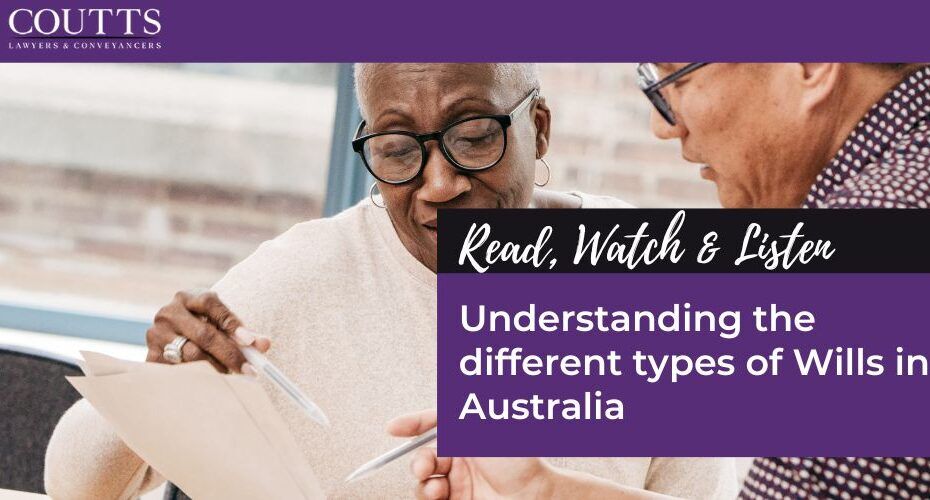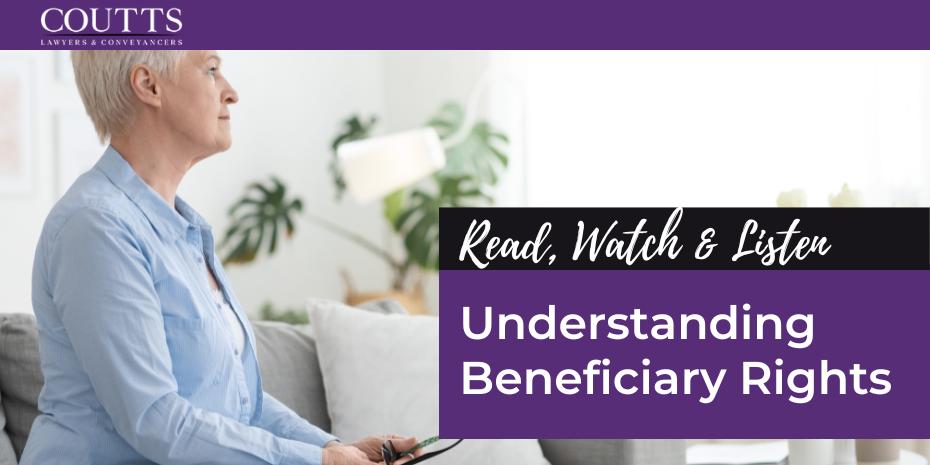When a person contacts a solicitor to make an appointment, one of the things they usually say when making the appointment is “I just need a basic simple Will”. Whilst this may be true, there are various types of Wills and the simple one may not be the right one for you.
What is a simple Will?
A simple Will is a Will suitable for:
- A single person with modest assets.
- A person who is in a marriage or de facto relationship with no children.
- A person who only has children from their current relationship or marriage.
A simple Will usually provides for all assets to be gifted to one person (such as spouse or partner) or class of persons (such as children), with an alternate provision if the one person nominated or all persons in the named class of persons do not survive the Will maker.
If a person has children from multiple partners or has significant assets, then a complex Will is usually more appropriate.
What is a complex Will?
A complex Will has multiple beneficiaries or classes of beneficiaries with different scenarios in the event that the nominated person or class of persons does not survive the Will maker.
For example:
Sally wants to leave her assets equally between her nieces and nephews, except for one nephew who lives overseas, as she does not see him. Sally must therefore name in the Will, the three nieces and nephews she does want to leave her assets to.
If one of her nieces does not survive her, Sally wants that niece’s share to go to the RSPCA.
If the other niece does not survive her, Sally wants that niece’s share to be divided between the Cancer Council and the Melanoma Institute.
If her named nephew does not survive her, Sally wants his share to be divided between his children and grandchildren when they turn 21 years old.
A complex Will may also instead of gifting a person’s home outright to someone, make provision for someone to live in their house while they are alive but on that person’s death, the house is instead given to other named beneficiaries.
For example:
Joe is married to Karen. Karen is his second wife. Joe has two children from his first wife Irene, who died 10 years ago after 40 years of marriage. Karen and Joe have been married for 5 years.
When Joe dies, he wants Karen to remain living in the house he owns and lives in with Karen. As however, it was the home he previously shared with Irene and in which they raised their two children, he wants his children to receive the house once Karen dies or no longer wishes to live there.
A complex Will may also make provision for assets not held in the name of the Will maker but which the Will maker has an interest in, such as a family trust or company.
What is a Mirror Will?
A mirror Will is a Will between two people which provides for identical terms in each of their Wills.
It is again most used by couples in a relationship who only have children together and who do not have children from previous relationships.
What is a mutual Will?
A mutual Will is a contract between two people which states that they cannot change the content of their Wills without the consent of the other person. The contract attaches a copy of the Wills.
A mutual Will is commonly used by couples who have children from previous relationships to ensure that on the death of the first of them, the other does not change their Will to remove the deceased person’s children and only benefit their own children.
Although this type of Will may sound appealing in a blended family situation, it does have its disadvantages, as it does not allow for possible changes in circumstances or needs of the surviving person.
It is not therefore generally recommended for younger couples who may subsequently remarry or have more children in the future, as the Will maker would be unable to provide for their new spouse and children in their Will.
What is a Testamentary Trust Will?
Instead of leaving assets outright to a beneficiary, a Will maker can elect to provide the gift in a trust that comes into effect on their death.
The advantages to a beneficiary receiving a gift in a trust rather than outright are:
- Flexibility: The beneficiary can use the terms of the trust to spread out receipt of the gift over a period of years, rather than receiving one lump sum.
- Tax: The beneficiary may be able to direct the gift to other individuals or entities and reduce their own tax liability (known as income splitting or streaming).
- Asset protection: If the beneficiary is facing insolvency or relationship difficulties, the gift cannot be claimed by the creditor or ex-spouse/partner, if it is in a trust.
What is a Protective or Special Disability Trust?
If you have a vulnerable beneficiary, it may not be prudent or possible for the beneficiary to manage the gift they receive in the Will.
You can therefore establish a trust in the Will that allows the beneficiary to benefit from the gift to meet their needs but not to have control of the gift. Instead, the trustee appointed in the testamentary trust will manage the gift on the vulnerable beneficiary’s behalf.
These types of trust are useful for beneficiaries who have gambling, drug, or alcohol addictions or who are spendthrifts.
If the vulnerable person has a disability that meets the definition of “severe disability” as assessed by the Department of Housing, a fund may be established to pay for any reasonable care and accommodation costs incurred by, or on behalf of, the beneficiary, including costs associated with organising the care and accommodation.
The advantages of a Special Disability Trust are:
- The beneficiary can have assets of up to $724,750 (indexed 1 July each year) before the beneficiary’s pension is affected,
- A gifting concession of up to $500,000 combined is available for eligible family members of the principal beneficiary, ie. the person making the gift will not have their pension affected if they gift the beneficiary within the concession limits.
Which Will Is right for me?
You should speak to one of the friendly and experienced Wills and Estates lawyers at Coutts Lawyers and Conveyancers to determine which Will is right for you.
For further information please don’t hesitate to contact:
info@couttslegal.com.au
1300 268 887
Contact Coutts Lawyers & Conveyancers today.
This blog is merely general and non-specific information on the subject matter and is not and should not be considered or relied on as legal advice. Coutts is not responsible for any cost, expense, loss or liability whatsoever in relation to this blog, including all or any reliance on this blog or use or application of this blog by you.



